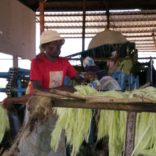Mozambique: Chapo launches 2025 agricultural marketing campaign - Watch
Mozambique: Mozambique: Storms, climate change impact sugar production

FILE - For illustration purposes only. [File photo: DW]
Production is falling at the Mafambisse Sugar Mill, one of the largest in Mozambique, due to the combined effects of bad weather and climate change, the administration there has announced.
“We are experiencing declines in our sugar production due to difficulties caused by the bad weather in the country in recent years,” Pascoal Macule, factory manager at the Mafambisse Sugar Mill, owned by the Tongaat Hulett Group, told reporters on Thursday.
READ: Tongaat shareholders vote against debt-for-equity swap
Macule said that the company’s annual production of 75,000 tons had fallen to 40,000 in the last two years, causing significant losses to the factory.
Another factor that influenced the sharp drop in production was the loss of around 8,000 hectares of sugar cane, the raw material for sugar production, due to the effects of climate change. “This in Nhamatanda, due to the drought in our fields and the El Niño phenomenon,” Macule explained.
Located in the administrative post of Mafambisse, in Dondo district, Sofala province, the Mafambisse sugar mill can produce 92,000 tons of sugar a year.
Mozambique is considered one of the countries most severely affected by climate change in the world, facing cyclical floods and tropical cyclones during the rainy season, which runs from October to April.
The 2018/2019 rainy season was one of the most severe in living memory: 714 people died, including 648 victims of cyclones Idai and Kenneth, two of the largest ever to hit the country.
Sofala province, in the centre of the country, has been one of the worst hit by storms.
In the first quarter of last year, heavy rains and the passage of Cyclone Freddy caused 306 deaths, affected more than 1.3 million people in the country, destroyed 236,000 homes and 3,200 classrooms, according to official government figures.
Tongaat Hulett recently announced an injection of 500 million rand (€25 million) into the Mafambisse and Xinavane sugar mills, both in Mozambique and in which the South African group is the majority shareholder.
The challenges facing the two sugar mills in recent times include countering a continuing decline in sugar sales and obtaining support to prevent low-priced sugar imports from entering the domestic market and affecting domestic production.
To turn the situation around, according to the director of Tongaat Hulett, Açucareira de Mafambisse adopted several strategies, including the search for more financial partners to leverage the company.
“We have recovered, although we have not met expectations. We are currently serving the markets of West Africa, the United States, Mauritius and Mozambique, and we are thinking of expanding the export market for our product to neighboring Malawi,” Macule concluded.












Leave a Reply
Be the First to Comment!
You must be logged in to post a comment.
You must be logged in to post a comment.